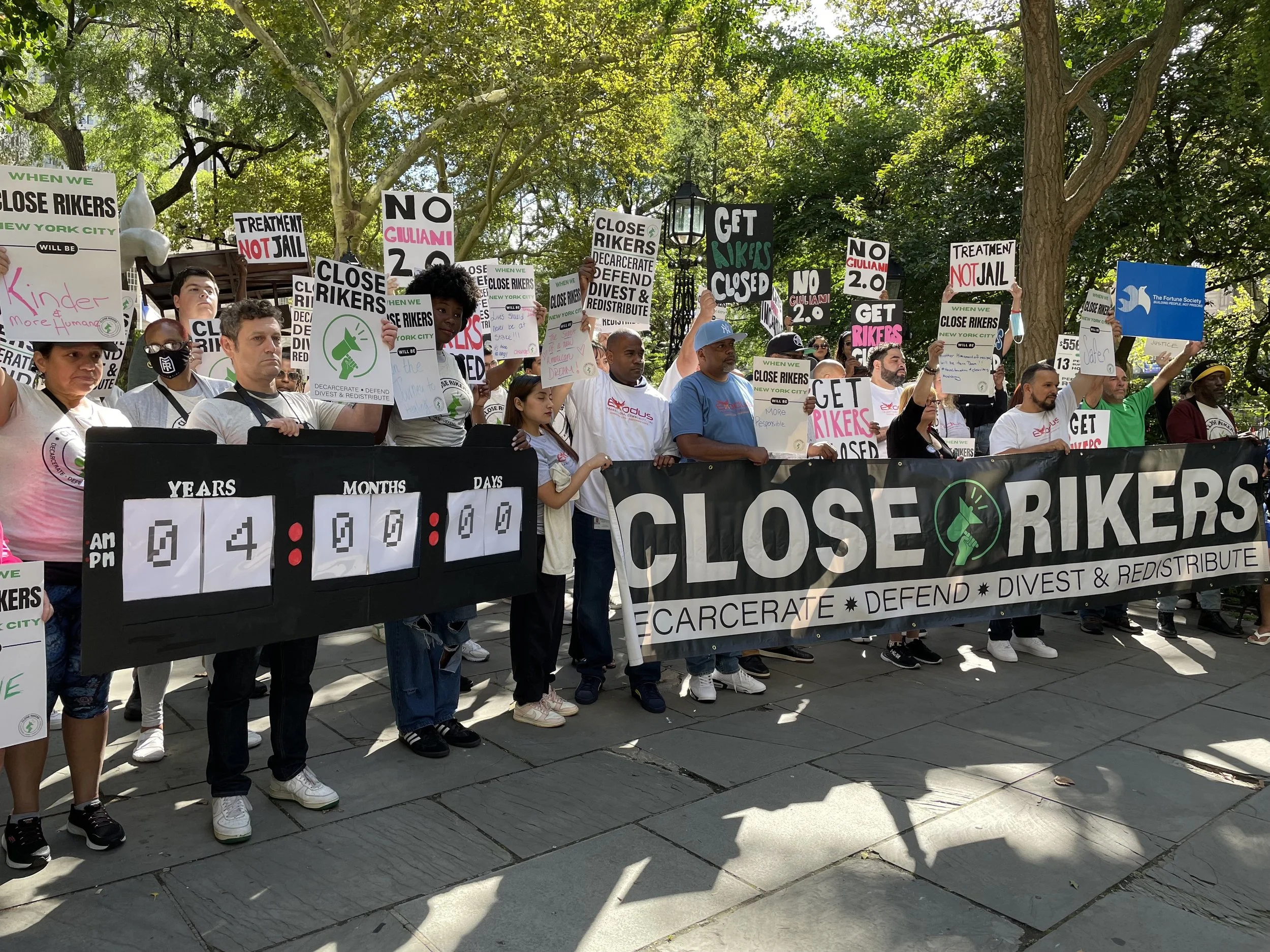Four year countdown to Rikers’ closure begins
/Advocates and a number of elected officials rallied outside City Hall on Thursday to mark the start of the four-year countdown to the closure of Rikers Island. Eagle photo by Jacob Kaye
By Jacob Kaye
Four years – as of Thursday, that’s exactly how long the city has to close its notorious jail complex on Rikers Island.
Whether or not that deadline of Aug. 31, 2027 can be met by the city is another question entirely, and one whose answer is becoming increasingly unclear.
But with the legally-mandated closure of Rikers Island officially four years away, dozens of advocates, formerly incarcerated New Yorkers and a handful of elected officials gathered outside of City Hall on Thursday to demand that Mayor Eric Adams get the city’s current – and only – plan to shutter the jail back on track.
“We call on the mayor to take every necessary action to do what he said he would do, to do what is legally required, and to do what is right,” Darren Mack, the co-director of Freedom Agenda, said during the rally. “We need to decarcerate now and spare people from the deadly environment of Rikers Island – and we need to move swiftly to shut it down for good.”
Though the city has been diverging from its plan to close Rikers by 2027 for the past several years, earlier this week, Adams said that he didn’t believe the plan could be executed by the deadline given the rising population on Rikers and the mounting costs associated with building four borough-based jails to replace the current jail complex.
The mayor, who inherited the borough-based jail program and the Renewable Rikers Act – which requires the city explore ways to turn Rikers Island into a renewable energy hub upon the jail’s closure – from former Mayor Bill de Blasio, also said that he wanted the City Council to pass a new law dictating the jail’s closure.
“It was a flawed plan from the beginning,” Adams said during a New York Law School event on Tuesday.
“Everyone created this ideal environment, and now we’re stuck with something that started at one price tag, and now it has ballooned beyond belief,” Adams added. “We must sit down with the City Council and lay out the facts – ‘This is what is going to cost, here's how we could do this, you are partners, let's resolve this issue.’”
According to the mayor, the biggest impediment to closing Rikers is its ballooning population. Since Adams took office at the start of 2022, the average daily population has grown from around 5,300 detainees to around 6,100, according to Department of Correction data.
The city’s four borough-based jails – there are plans to build one in Brooklyn, one in Manhattan, one in the Bronx and one in Queens – are only expected to be able to hold around 3,300 detainees at any given time – the Adams administration announced earlier this year that the Brooklyn jail would now have 1,040 beds instead of the originally proposed 886 beds, an increase made possible by eliminating beds and areas designated for detainees with mental illness.
But rallygoers on Thursday accused the Adams administration of not taking steps to lower the population on Rikers.
“This mayor is not planning for a future that we want,” said Brooklyn Borough President Antonio Reynoso, who has been floated as a potential progressive challenger to the mayor in 2025. “His future increases the population on Rikers Island – that's his vision and that's not leadership.”
“Leadership says, ‘I'm going to do it, we're going to figure out a way that we don't need to lock up Black and brown men to make this city safe,” the borough president added. “He has a narrow-minded picture and view of what we are living like today, saying, ‘No, the way to achieve safety is to incarcerate Black and brown men. We need more of that. We need to make these jails bigger. We need to remove mental health beds and services that we know can actually solve our problems.’”
A spokesperson for the mayor’s office denied that the mayor wasn’t committed to closing Rikers in a statement to the Eagle on Thursday.
“As the mayor has said repeatedly, this administration will always follow the law,” the spokesperson said. “It has become painfully clear that the plan passed by the City Council during the previous administration leaves open serious questions about the city’s ability to keep New Yorkers safe, while the costs are exploding.”
“Despite the challenges of the pandemic and inflation, the Adams administration is continuing to move forward with the borough-based jail projects — accelerating the timeline, managing costs, and adding capacity to protect public safety,” the spokesperson added. “And the administration remains focused on keeping New Yorkers safe and pursuing upstream solutions to keep young people out of the criminal justice system wherever possible.”
Andre Ward, the associate vice president of public policy at the Fortune Society, said, however, that he believes the administration and the Department of Correction have failed to pursue some of the “upstream solutions” available to the city.
In June, the DOC announced that it was cutting a $17 million contract with five nonprofits, including Fortune Society, because of budget concerns. The contract with the nonprofits paid for a number of social programs, including reentry services, that the DOC said it would now provide to detainees using agency staff instead of third-party providers.
“Our $17 million contract has been removed from DOC’s budget in the name of removing vital and critical services offered by the likes of Fortune,” Ward said. “And yet, it costs almost half a million dollars or so to jail someone on Rikers Island. That same half a million dollars can allow for 13 people to access supportive housing.”
“I think it insults logic and reason to jail people rather than to put them in housing, where they can receive the necessary requisite services that they need, ” Ward added.
The move to cut the DOC’s contract with the providers was heavily criticized at the time by City Councilmember Carlina Rivera, who serves as the chair of the Council’s Committee on Criminal Justice.
In a joint statement with City Council Speaker Adrienne Adams issued on Thursday, Rivera said that it is “imperative that Mayor Adams’ administration take responsibility for implementing the law, including working collaboratively with stakeholders involved in the criminal legal system to advance necessary progress.”
“For decades, Rikers Island has cultivated a culture of brutal violence and dysfunction, compelling the City Council to pass legislation to end the humanitarian crisis in our city’s jails and transition to a more effective and safer borough-based system,” the lawmakers said.
Speaker Adams and Rivera added that more needs to be done in the earlier stages of the criminal justice system to reduce the population of Rikers.
“The City must make consistent investments in pretrial services, alternatives to incarceration, and re-entry services, while addressing unacceptable lengths of stay with the courts, district attorneys, and public defenders,” they said.
“We cannot allow Rikers to continue undermining public safety and must continue the necessary work of implementing a more effective approach to public safety,” Speaker Adams and Rivera added. “The record deaths and continued violence, which endangers both staff and detained individuals, reaffirms the Council’s 2019 decision to bring this shameful chapter in the city’s history to an end and only emphasizes the urgency we must act with moving forward.”




